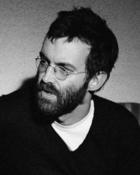
Mark Oliver Everett showed no talent for physics as a child, to which his father, Dr. Hugh Everett III, "one of the most important American scientists of the twentieth century" (according to Scientific American), who as a young man it was signed with Einstein and whose interpretation of the multiple universes gave rise to countless science fiction books, movies and episodes of Star Trek.
Poetry, on the other hand, came from his mother, who wrote and may he rest in peace, as rest the whole family of Everett, which is why he does not know what to put when asked who to contact in case of emergency. Although, everything is said, at least there is always a good woman by his side, or at least a half-crazy woman even though, as he says, Everett is so ugly. That is why poetry also comes to him, sure, from the history of the whole family and from the life he has had to live.
Anyway, Everett was always more interested in the albums that his sister listened to (like every afternoon, for a year, the After the Gold Rush by Neil Young), and although he never dreamed of getting to play the same vertical piano with the Young recorded that record (as one day was going to happen), his musical vocation was not only early, but he managed to overcome a proverbial insecurity.
When he was ten years old, he had Lennon's first solo album as a favorite, as you might expect from a dysfunctional kid, but also solved: at six he had already bought his first toy battery at a flea market. In adolescence, after having composed a few songs on the piano at home, it was made with a guitar that accumulated dust in the closet (his sister's). Naturally at 20 he was obsessed with recording songs on four tracks (also second-hand), and at 24 he was going to go to the big city to do the only thing he was convinced to want and be able to do. Although then it turns out that what one leaves behind always persecutes him and also that, thanks to that (to the misfortune that, as a famous novelist wrote, saves some families from being equal to all) and of course to the incontestable genius, Everett could also write your autobiography Things grandchildren should know. And those who will come, we wait.
Because Everett seems to write a little unintentionally, but that must be his way of wanting a lot and well, of doing what he touches without submitting, as he has always done: being a Stoic without looking virtuous, and who knows if they want it more, that is why someone has said that writers write. And surely if you read this the book will excite you.
Seen above, the history of the book, its history, looks a bit like many: introverted and cursed boy catches the music virus, moves to Los Angeles, where he doesn't know anyone, works on what he touches and, to tenacity force with the apparatus of the four tracks (and of course a bit of fortune), in fact he manages to sign his first contract. The first of many, as will force the abnormality of his band, Eels, celebrated by other atypical elements such as Tom Waits, Van Morrison and yes, Neil Young, as well as strangely recognized by the public as well as critics, as they say.
But then comes everything else, what we best let Everett himself tell, because nothing he has done or lived is similar to what others have lived (and yet E is like all of us), and of that, about Everything goes your book.




